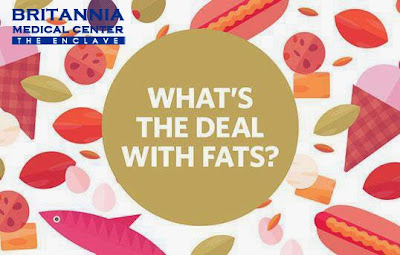Bad Fats
Let's take a quick
look at the bad boys first. The bad fats that can sneak into your food are
saturated fat. Common sources of saturated fat are butter, ghee, hydrogenated
vegetable oil, coconut oil, and cheese. Saturated fat is also present in
full-fat dairy products, meat, chicken and eggs. Saturated fat raises the level
of artery clogging bad cholesterol or LDL in your blood. You should not consume
more than 14 to 20 grams of saturated fat in a day. Opting for low fat milk,
lean meats, butter etc. in moderation can help you avoid over consuming
saturated fats.
Trans fats are much worse than saturated fats. They not only increase the bad cholesterol or LDL, but also decrease the artery-protecting good cholesterol or HDL. Worse still, they are also suspected to increase the risk of other diseases such as type 2 diabetes, colon cancer and breast cancer. If you are wondering how such horrible fats could be finding their way into your body, look at the common sources: cookies, crackers, cakes, muffins, pastries, pizza, hamburger buns, pre-mixed cake mixes, pancake mixes, chocolate drink mixes, donuts, French fries, chips, candy, packaged or microwave popcorn, frozen dinners. Wow! That's a long but not a comprehensive list. In short, you can say that processed foods are a big source of trans fats. The recommended daily intake of trans fats is 1 to 2 grams per day.
Bad publicity around trans fats has encouraged the food industry to come up with trans fat free foods. You may have noticed labels saying "zero trans fat" on some packages. The worrisome bit is that zero isn't really zero. Regulations allow a food that has less than 0.5 gm trans fat "per serving" to be called trans-fat-free. Now again "serving" is a very tricky word because the manufacturer's concept of a serving maybe very different from yours. The bottom line is that you maybe consuming a good amount of trans fats even when having supposedly trans-fat-free food. The best option is to limit your intake of processed food.
Good Fats
Trans fats are much worse than saturated fats. They not only increase the bad cholesterol or LDL, but also decrease the artery-protecting good cholesterol or HDL. Worse still, they are also suspected to increase the risk of other diseases such as type 2 diabetes, colon cancer and breast cancer. If you are wondering how such horrible fats could be finding their way into your body, look at the common sources: cookies, crackers, cakes, muffins, pastries, pizza, hamburger buns, pre-mixed cake mixes, pancake mixes, chocolate drink mixes, donuts, French fries, chips, candy, packaged or microwave popcorn, frozen dinners. Wow! That's a long but not a comprehensive list. In short, you can say that processed foods are a big source of trans fats. The recommended daily intake of trans fats is 1 to 2 grams per day.
Bad publicity around trans fats has encouraged the food industry to come up with trans fat free foods. You may have noticed labels saying "zero trans fat" on some packages. The worrisome bit is that zero isn't really zero. Regulations allow a food that has less than 0.5 gm trans fat "per serving" to be called trans-fat-free. Now again "serving" is a very tricky word because the manufacturer's concept of a serving maybe very different from yours. The bottom line is that you maybe consuming a good amount of trans fats even when having supposedly trans-fat-free food. The best option is to limit your intake of processed food.
Good Fats
Unsaturated fats, often
listed as monounsaturated fatty acids (MUFA) and polyunsaturated fatty acids
(PUFA) on food labels are good for you because they protect your arteries from
clogging. Good fats are found in oils such as olive oil, sunflower oil, mustard
oil, canola oil, safflower oil, nuts, particularly walnuts, pistachio, almonds,
groundnuts and fish.
It makes sense to choose your fats carefully. However, do remember that all fats have the same number of calories (9 calories per gram) and keeping a check on your total calorie intake is a must for avoiding obesity and its hazards.
It makes sense to choose your fats carefully. However, do remember that all fats have the same number of calories (9 calories per gram) and keeping a check on your total calorie intake is a must for avoiding obesity and its hazards.
http://www.healthcaremagic.com/insights/The-good-the-bad-and-the-ugly-of-the-big-fat-world/3?utm_content=bufferc1290&utm_medium=social&utm_source=facebook.com&utm_campaign=buffer

No comments:
Post a Comment